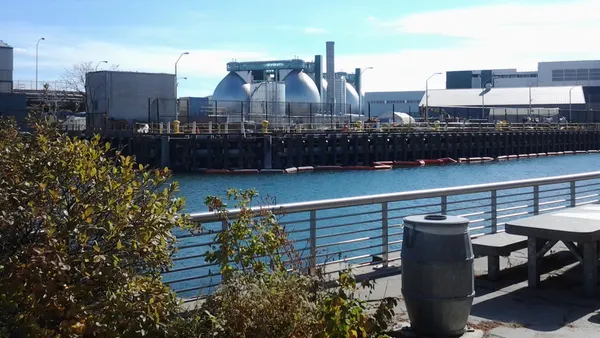Dive Brief:
- Bioenergy DevCo (BDC), a developer of more than 200 anaerobic digestion facilities in Europe, has announced new financing to fuel a U.S. expansion. A $106 million investment from Newlight Partners is expected to help cover the risk capital for 20-plus facilities.
- The first U.S. digester from BTS Biogas (a recently acquired subsidiary of BDC) is slated for Jessup, Maryland. The 100,000 ton-per-year facility will be co-located with the Maryland Food Center Authority, a major food distribution hub. Three other U.S. projects are also in the works.
- While the U.S. market has yet to see any one digester company dominate nationally, BDC considers its combination of technology and financing to be uniquely strong. "We believe that we'll be the best positioned to be able to take advantage and do this on a very large scale," CEO Shawn Kreloff told Waste Dive.
Dive Insight:
This financing announcement is the latest counterpoint to a longstanding waste industry narrative asserting that organics processing technology isn't profitable, and the material can be equally well-managed in landfills with gas capture systems. BDC is among multiple companies banking on that paradigm shifting — encouraged by the growing prevalence of government policy drivers and corporate sustainability goals.
Kreloff noticed all of these factors coming together in the U.S. more favorably during the past year or so, prompting the company to establish a North American headquarters in Maryland. BDC is also working on a second project in Maryland, along with sites in Westchester County, New York and central New Jersey. Other projects are in earlier stages of development for markets including the Pacific Northwest, the East Coast and potentially the Midwest.
While state and local organics diversion mandates are helpful policy drivers, Kreloff doesn't believe they're the only way to make projects work. Demand for natural gas infrastructure is another factor, along with pricing. The company's goal is to be competitive with disposal tip fees — "we can't always do better, but we can generally do better" — and to potentially reduce transportation costs for haulers.
"Because of where we can locate our plants, we have a competitive advantage over landfills and incinerators," said Kreloff. "We can put our plants on five acres of land and they're not as intrusive as a landfill or an incinerator."
As interest rises in organics solutions due to a variety of factors — including the potential to reduce greenhouse gas emissions contributing to the climate crisis — the announcement supports the investment potential for developers of digester projects. Development is particularly active in areas such as California (due to upcoming requirements under SB 1383) as well as the Northeast.
The recent reintroduction of a bill in Congress that would establish new investment tax credits for various biogas projects is yet another potential driver of expansion in the U.S. Kreloff said he supports the bill, but was also confident that financing is already becoming more sustainable for such projects.
"Of course it's great to have support at the federal level," he said. "But what’s nice about these projects is if you put them in the right place, they really do stand on their own. I think that's rare for this type of renewable energy investment."









